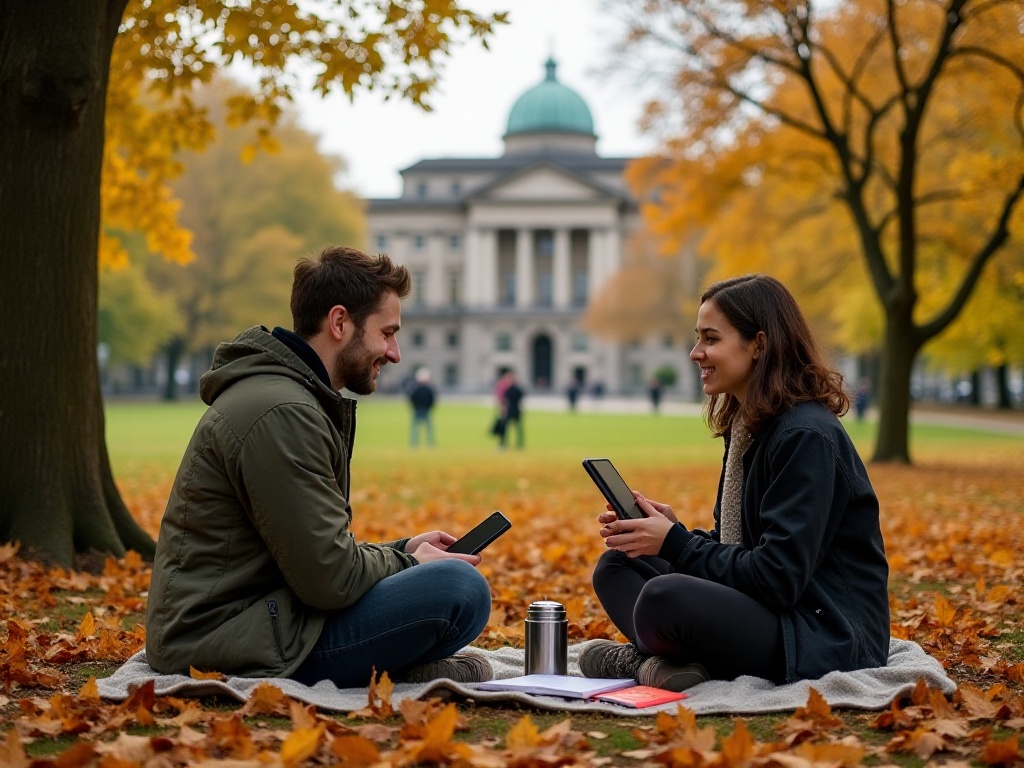
Pre-departure Hesitation
To be honest, I was really anxious before departing. The thought of living alone in Korea for two months brought waves of worries. Rent in Seoul wasn't cheap - I searched many platforms and looked at countless listings. Initially, seeing monthly rents of 5000-6000 yuan almost scared me away. Finding the right place was also challenging, considering location, transportation convenience, and nearby amenities.
The language barrier was an even bigger concern. Although I'd learned some Korean from watching K-dramas and variety shows, actually living there would be completely different. The thought of communicating with landlords, shopkeepers, and handling daily affairs in Korean felt overwhelming. I also worried about what to do if I got sick, couldn't find my way home, or faced emergencies.
But then I thought - wouldn't it be a shame to give up because of these worries? This might be one of the few chances in my life to fully immerse myself in living and learning in a foreign country. Besides, Seoul is an international metropolis with excellent infrastructure, so major problems seemed unlikely. With modern technology like translation apps, navigation software, and abundant online resources, I felt these challenges could be overcome with proper preparation.
Pre-departure Preparation
Once I made up my mind, I had to prepare thoroughly. Learning Korean was my top priority. I downloaded several learning apps like TOPIK Korean, Daily Korean Conversation, and Korean Flashcards, studying whenever I could. I also bought a Korean conversation book full of practical everyday dialogues.
I memorized basic greetings, numbers, and directional words until they became second nature. I practiced high-frequency phrases like "excuse me," "sorry," and "thank you" repeatedly, worried I'd forget everything once I got there. Looking back, I may have overdone it since many textbook expressions weren't useful in real life. Still, the preparation gave me some psychological security.
Beyond language, I did lots of other preparation. I studied Seoul's subway map and marked potential destinations; downloaded common Korean apps like Kakao Map (navigation), Kakao T (taxi), and Baemin (food delivery); and researched many Seoul living guides to understand local customs and important considerations.
Most importantly, I found accommodation in advance. I booked a small studio near Hongdae through Airbnb. Though small, it was well-located near subway stations, supermarkets, and restaurants. The English-speaking Korean landlord seemed reliable during our communications, which was reassuring.

First Arrival in Seoul
Finally arriving in Seoul, the first week was chaotic. Despite all my preparation, facing an unfamiliar environment was still overwhelming. On arrival day, just getting from Incheon Airport to my accommodation took ages. Although I'd checked the route beforehand, I still made several wrong transfers at subway stations. Fortunately, the subway signage was clear, and people were very helpful when I asked for directions.
After settling in, my first task was buying necessities at a nearby convenience store. My heart raced as I entered. Despite all my preparation, speaking Korean still made me nervous. I remember stuttering "annyeonghaseyo" (hello), and the clerk smiled back. Then I asked for toothbrush and toothpaste in broken Korean - though my pronunciation wasn't great, the clerk patiently listened and showed me the right shelf.
Most delightfully, at checkout, seeing I was foreign, the clerk deliberately slowed their speech and used simple Korean. They even taught me how to use the store's loyalty card, though I might only use it once or twice. Their warmth really touched me. After that, I frequently visited that store, gradually becoming familiar with the staff and making it my Korean practice spot.
Those early days in Seoul felt like constant adventure. Grocery shopping, taking the subway, ordering delivery - every small task was challenging. But these challenges helped me quickly adapt to local life and noticeably improved my Korean.

Rapid Language Progress
During my two months in Seoul, my Korean improved faster than expected. This progress wasn't just from being in a Korean-speaking environment - more importantly, I actively created opportunities to practice Korean.
I deliberately chose a nearby Korean café as my "mobile office." The owner, a man in his fifties, was very friendly. At first, I could only order "one Americano" in Korean, and he would patiently correct my pronunciation. Gradually, our conversations became richer. From simple greetings to discussing weather, then talking about popular Korean dramas.
Once while I was working at the café, it suddenly started pouring. The owner saw I didn't have an umbrella and lent me one, telling me to be careful. In his words, I had become a "regular" at his shop. That feeling of acceptance by locals was truly warming.
Besides the café, I often ate at nearby restaurants. When ordering, I deliberately avoided English, persisting with Korean even if I made mistakes. Most establishments supported my learning attitude, sometimes teaching me authentic expressions. For example, at a kimchi soup restaurant I frequented, the owner would teach me food-related words and expressions whenever I visited.
I discovered that learning language in real life was much more effective than just studying textbooks. I learned numbers and currency units at convenience stores, directional words and time expressions at subway stations, and food names and taste adjectives at restaurants. These words and grammar points stuck better because they had real-world context.
Moreover, real-life language learning often brought unexpected rewards. A simple Korean conversation could develop into an interesting chat. Through these daily conversations, I not only improved my Korean but also learned about Korean customs and lifestyles.

Unexpected Gains
During my two months in Seoul, I gained more than just language skills - I made many friends. Most surprisingly, I met a group of aunties while jogging in the park.
Initially, I just ran in the park every morning, often seeing a group of aunties dancing. Yes, you read that right - Korean aunties also like plaza dancing! One morning, while I was running and watching them dance, one auntie waved at me to join. Though shy, I joined them.
These aunties, all in their fifties and sixties, were full of energy. They were very patient teaching me to dance, explaining movements in simple Korean. Gradually, morning exercise became one of my most anticipated daily activities. The aunties not only taught me dancing but also shared Seoul's history and authentic Seoul dialect. Sometimes after dancing, they'd take me to nearby breakfast spots for Korean breakfast.
Through the aunties, I also met their families. One weekend, an auntie invited me to her home for dinner, giving me a genuine Korean family gathering experience. Her son and daughter-in-law spoke English, but we mainly communicated in Korean that day, with them patiently correcting my pronunciation and grammar.
Besides the dancing aunties, I met many young friends. My regular café often held language exchange events where I met several Korean university students interested in learning Chinese. We often ate together, watched movies, and learned each other's languages and cultures. Sometimes I taught them Chinese while they taught me Korean - this mutual learning process was particularly fun.
Another time, I met an American exchange student at a kimchi-making class. Both being foreigners learning Korean, we quickly became friends. On weekends, we often explored Seoul's corners together, encouraging each other to use Korean with locals. Having a companion to learn with felt great, preventing loneliness in a foreign country.

Culture Shock
During my time in Seoul, I deeply experienced various aspects of Korean culture. Most impressive was how much Koreans value etiquette.
For instance, at restaurants, young people must wait for elders to start eating; when drinking, you must receive glasses with both hands and turn your head while drinking; giving up seats to elderly on the subway is an unwritten rule. These etiquette rules felt awkward at first, but gradually I realized they reflect Korean society's tradition of respecting elders and caring for the young.
Korea's waste sorting system also impressed me. Each type of waste has specific collection times and methods - regular garbage needs designated bags, food waste must be separated, recyclables must be cleaned and sorted. I often sorted incorrectly at first and was reminded by neighbors several times. Looking back, this strict environmental consciousness keeps Seoul's streets so clean and tidy.
Through language learning, I also gradually understood the cultural implications in Korean. For example, Korean has many honorific systems, requiring different particles and word forms based on the listener's age and status. This language feature reflects Korean society's hierarchical concepts and tradition of respecting elders.
Another interesting discovery was how Korean expressions reflect collective consciousness. Koreans often say "our home," "our company," "our school," even when referring to their own home or company. This expression style reflects Koreans' strong sense of collective belonging.
Food culture is also distinctive. Koreans emphasize "eating together" - eating alone is considered lonely. Many Korean restaurants have single-seating areas specifically designed for solo diners. Koreans also love sharing food - whether at school or work, colleagues often share snacks and drinks.
Regarding work, I found Korea's café culture particularly developed. Many people like working or studying in cafés, sometimes staying for hours. Cafés aren't just for coffee but spaces for socializing and working. I often saw students reviewing lessons, office workers in video meetings, even people conducting business meetings.

Unexpectedly Touching Moments
During my Seoul days, many heartwarming stories occurred. Most memorable was getting lost in the subway.
That day I was heading somewhere new. Despite checking the route beforehand, I took the wrong direction during a transfer. While I was anxious, an elderly lady approached asking if I needed help. I explained in broken Korean - though she didn't speak English, we communicated through gestures and simple Korean words.
The grandmother not only patiently listened but accompanied me to the correct platform. While waiting for the train, she shared many Seoul subway transfer tips. Before leaving, she reminded me to stay safe and gave me a warm hug. This warmth between strangers deepened my feelings for Seoul.
Another time, I twisted my ankle on the street. While I could barely walk, a nearby convenience store clerk immediately ran out to help me inside and brought ice. Using simple Korean, he asked if I needed an ambulance or taxi, being extremely friendly. Finally, he helped call a car and ensured I got home safely.
These small gestures might seem ordinary to others, but for someone in a foreign country, such warm actions were truly touching. This made me realize language barriers aren't the biggest obstacle - kindness and care transcend national boundaries.

Real-life Troubles
Of course, living alone in Seoul wasn't all smooth sailing. The biggest issue was expenses. My small studio, though well-located, cost over 4000 yuan monthly. Beyond rent, daily living expenses weren't low.
Korea's delivery culture is very developed, but prices aren't cheap. A regular delivery lunch costs 50-60 yuan, and easily exceeds 100 yuan for better options. Though cooking could save money, ingredients in Korea aren't cheap, and cooking for one often wastes food.
Transportation was another significant expense. Though Seoul's subway and bus system is developed, frequent long-distance trips or late-night taxis add up quickly.
Communication costs too. Getting a phone plan in Korea costs much more than in China, with less data. I spent over 300 yuan monthly just on phone bills.
Though these expenses seem high, they're manageable with proper budget planning. I'd make breakfast at home, eat lunch out, and cook simple dinners. For weekend trips to distant places, I'd plan routes to maximize public transport use.
I think these expenses were worth the experience. During my Seoul stay, I improved my Korean, experienced many Korean cultural activities, and made many friends - these experiences are priceless.
Advice for You
If you're considering staying in Korea or another country, my advice is to go for it. Of course, prepare thoroughly before departing.
First, language preparation is important but don't stress too much. What's important is having an open mindset and willingness to communicate with locals. The Koreans I met were all friendly - even if your Korean isn't perfect, they'll listen patiently and slow down for you.
Second, definitely plan your budget ahead. Beyond basic rent and living expenses, reserve money for experiencing local culture - like trying on hanbok, learning Korean cooking, or watching performances. These activities cost money but help you understand Korean culture deeper.
For accommodation, prioritize convenient transportation locations. Choose places near subway stations for easy shopping and travel. Korea's generally safe, so returning home late is relatively secure.
Maintain an open and accepting attitude in daily life. You'll encounter many differences from home, like waste sorting systems and dining etiquette. These are opportunities to understand local culture - don't complain, try to understand and adapt.
Also, participate in social activities. Join language exchange events to meet local friends. Friends help improve your language skills and make foreign life less lonely.
Finally, record your daily experiences. Write diaries or take photos and videos. These records help review Korean and become precious memories.
Changes After Returning
Two months of solo living in Seoul brought big changes. Beyond Korean improvement, I gained new perspectives on language learning. I discovered language isn't just a communication tool but a key to understanding a country and culture.
Through learning Korean, I understood Koreans' thinking patterns and values. For example, Korean's many respectful terms and grammar reflect Korean society's emphasis on etiquette and hierarchy. Unique Korean expressions also deepened my understanding of Korean culture.
After returning, I maintained Korean learning habits. I listen to Korean podcasts daily, watch Korean dramas, and sometimes video chat with Seoul friends. Though not in Korea, these methods help maintain language feel and steadily improve my Korean.
I most miss daily life in Seoul. Morning plaza dancing with aunties, afternoon working at the café chatting with the owner, evening small talk with convenience store clerks buying ramen. These ordinary moments became my most precious memories.
This experience made me more independent and confident. I discovered I could live well in an unfamiliar environment - this confidence extends beyond language learning to other life aspects.

To Be Continued
The Seoul solo living experience gave me great confidence and motivation. I'm now planning my next language learning journey. I want to stay in Japan for a while, experiencing different language and culture.
Each country has unique charm, each language unique cultural implications. Living in different countries helps us learn languages, broaden horizons, and gain knowledge.
Life is about trying new possibilities. Like my transition from anxiety before first visiting Seoul to current confidence, each attempt brings unexpected gains. So if you're thinking about living abroad, don't hesitate - boldly try!
So, do you have similar language learning experiences to share? Or are you planning to live abroad for a while? Looking forward to hearing your story!
Next
Learning Languages in Foreign Lands: An Immersive Experience Shared by a Travel Blogger
Explore the dynamic relationship between travel and language learning, examining how immersion enhances language skills and how linguistic abilities deepen travel experiences through cultural engagement and authentic interactions
One Person's Language Journey: Measuring the World with Footsteps, Making Travel the Best Language Classroom
Explore effective methods and benefits of learning languages through travel, combining immersive strategies with practical approaches, supported by digital tools and structured resources for enhanced language acquisition and personal growth
One Person's Language Learning Journey: My 90-Day Immersion Experience in a Rural Japanese Town
Explore how travel facilitates language learning through immersive environments, covering natural and structured learning methods, along with guidance on choosing suitable language programs and courses to enhance language skills while traveling
Next

Learning Languages in Foreign Lands: An Immersive Experience Shared by a Travel Blogger
Explore the dynamic relationship between travel and language learning, examining how immersion enhances language skills and how linguistic abilities deepen travel experiences through cultural engagement and authentic interactions

One Person's Language Journey: Measuring the World with Footsteps, Making Travel the Best Language Classroom
Explore effective methods and benefits of learning languages through travel, combining immersive strategies with practical approaches, supported by digital tools and structured resources for enhanced language acquisition and personal growth

One Person's Language Learning Journey: My 90-Day Immersion Experience in a Rural Japanese Town
Explore how travel facilitates language learning through immersive environments, covering natural and structured learning methods, along with guidance on choosing suitable language programs and courses to enhance language skills while traveling



